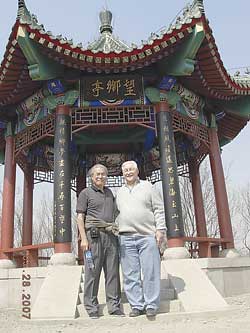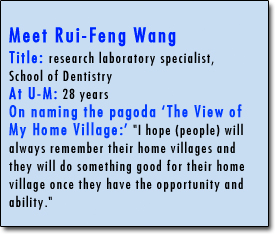One could compare Research Laboratory Specialist Rui-Feng Wang to a modern-day Noah. Both were builders who followed a unique vision. And while there was no flood, Wang, like Noah, made history.

In 1979, Wang joined the Department of Biologic and Material Sciences after leaving his position as a genetic researcher at the Natural Science Academy of China. Upon arriving in Ann Arbor, Wang accepted the University as his new home.
“After coming to the U.S., I’m very happy and my family is happy,” says Wang, now in the School of Dentistry.
But memories of his homeland never left his mind. Wang fondly recalled the local park at the Beijing University of Agriculture he would view through his office window.
“The mountain where the park is located was the front line of the Chinese guerrilla fighting against the Japanese occupation until the end of World War II,” he says. “So there was nothing but rocks there.”
Wang was surprised to see the park flourishing with trees and vegetation during a 2002 visit. When he toured the area with some of his former co-workers, they explained that they were a part of a volunteer group that helped replant trees.
“My old colleagues told me they carried bags of soil onto the mountains and planted small trees one-by-one with their hands,” Wang says. “This story impressed me a lot.”
Before leaving the site, Wang saw a small pagoda in the park that a group of former Japanese soldiers had donated. The soldiers built the pagoda to illustrate their apology for war against the Chinese people. These two stories inspired Wang to leave a mark on the battlegrounds as well.
In 2003 he returned to Beijing and discussed building a new pagoda with park officials. Once he donated money for the project, an engineer constructed Wang’s vision. Within one year, hired workers built the entire structure by hand. “They were very professional people to build the Chinese traditional architecture,” Wang says.
He declines to say how much he donated to build the pagoda. “I’m not rich at all,” Wang says. “I thought, through my donation, I might be able to demonstrate something to the rich people that they could do if they wish to do so.”

The structure stands nearly 25 feet high, 21 feet wide and was built with solid wood, a granite base and marble. The pagoda was named “The View of My Home Village” during a dedication ceremony Oct. 12, 2005, in Beijing. Wang says he discussed the styling and artwork of the pagoda with the engineer, but the name was his decision.
“The name has a symbolic meaning because every human being has their own route to the place where he or she grew up,” he says. “I hope (people) will always remember their home villages and they will do something good for their home village once they have the opportunity and ability.”
Wang thinks if every person positively contributes to their communities, the world would be a better place. The pagoda serves as his way of implementing this philosophy of giving back to one’s homeland. But Wang proudly notes that he has many origins.
He was born in Japan; his parents moved from Taiwan Island, then under Japanese occupation, back to Japan before the outbreak of World War II. After Wang graduated from Tsukuba University of Japan, he moved to mainland China.
“I’m cosmopolitan,” he exclaims with a laugh. Citing his diverse background, Wang stresses that the pagoda story is more about humanity and less about nationality.
“I think, not only for the people of China but also for the entire world, it is important to settle the problem existing between the mainland China and the Taiwan Island peacefully,” he says. He adds that building the pagoda was his attempt to demonstrate his sincere wish for peace.
The pagoda is open to the public. Wang visits the site every year on the anniversary of its dedication. Occasionally, friends will send him photos of people sitting in the pagoda. “Ah, I just love to hear that,” he says, smiling. He delights in sharing these photos and stories with fellow staffers at the School of Dentistry.
The “Bai-Wang-Shan” park featuring the pagoda is in the west suburbs of Beijing. The park office can be contacted at 011-86-10-6288-4508.

